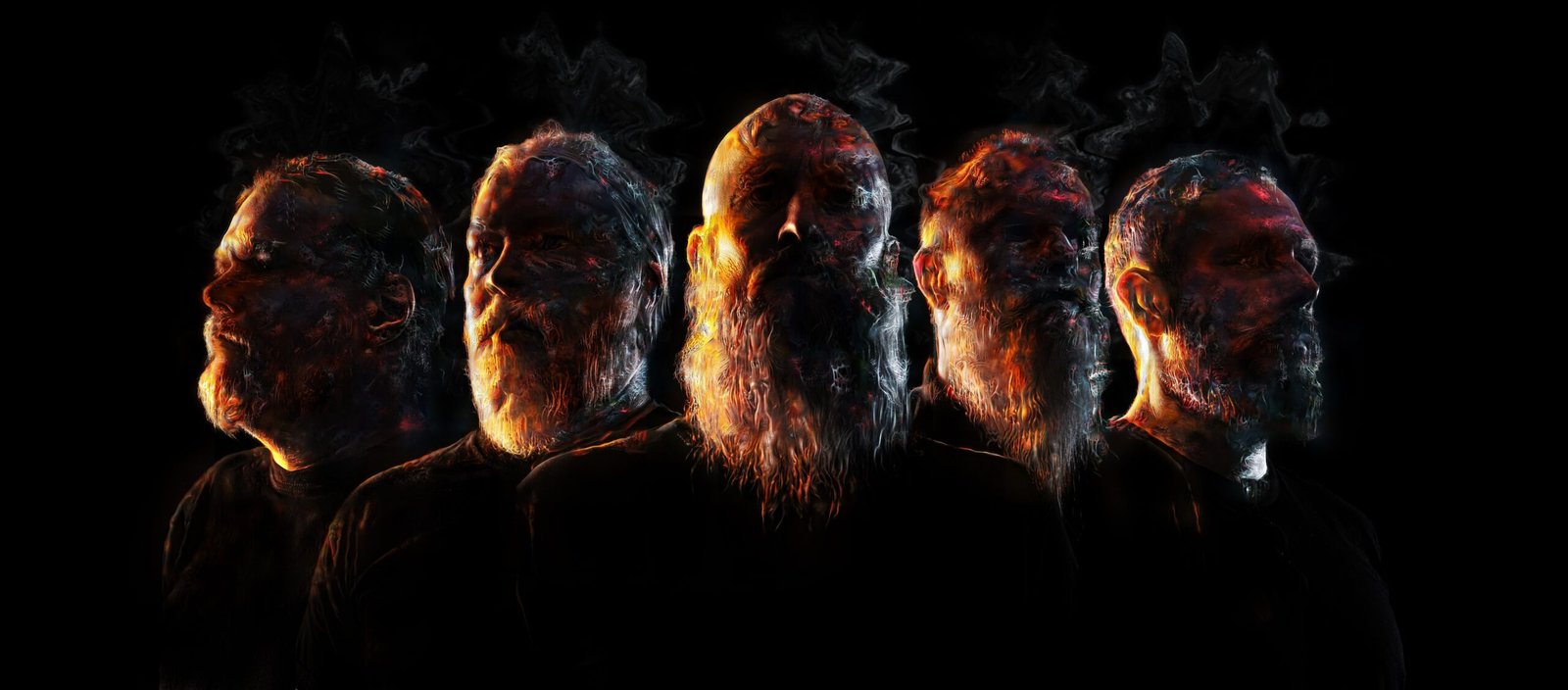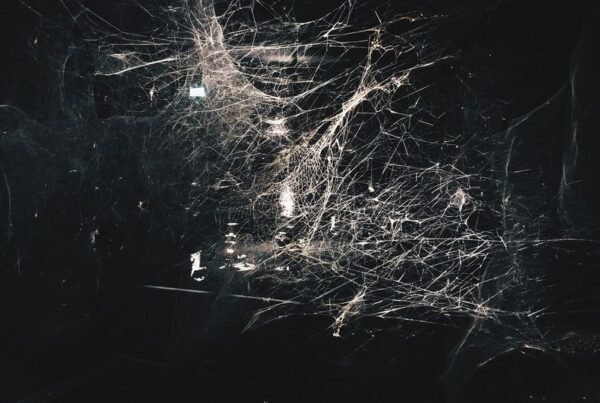Meshuggah returns to form on Immutable, sprouting forth an album of monolithic proportions inflated with their signature aural dish of eternally contorting and tortuous demolition.
Release date: April 1, 2022 | Atomic Fire Records | Official Site | Facebook
I have tremendous issues with people, both in general and when it comes to the ‘everyone’s a critic‘ notion. Critique itself is very much welcome when it’s conveyed in a constructive fashion, whereas a mere barrage of overly negative complaints without further elaboration is usually veiled as such, even though the two are drastically different things. I am certainly not a ‘happy-happy-joy-joy’ person, looking at everything through rose-tinted lenses, but at the same time I do think that unless you have a sentence or two at the very least to back up your trendy bashing, you might as well just shut it. Opinions are opinions, and everyone’s entitled to one for better or for worse, but it’s exhausting to try to have a conversation with someone stuck up and set in their ways just for the sake of it. Should every single statement have a thesis’s worth of arguments to back them up? No, I don’t think so. That said, it’s always preferable to be able to word your feelings rather than to try to transcend the very idea of reasoning and backing yourself up.
Meshuggah, as bonafide boundary-pushing and ultimately revered legends and pioneers as they are, have received an awful lot of discord and negativity within the past decade or so, with most of it being unjustified. We’re all aware of the band’s history – starting out as a super-disjointed thrash band and evolving into something truly unique around the turn of the millennium, breaking all imaginable molds and producing a genre entirely of their own, with a billion copycats yet unparalleled in their craft. The streak of Destroy Erase Improve (’95), Chaosphere (’98), and Nothing (’02) truly cemented the group’s status as a singular being bigger than life, but the following, more experimental releases, I (’04) and Catch Thirtythree (’05), were so out there that – albeit being generally held to a high regard – they flew over the heads of a certain group of people that usually turn out to be the most vocal one, sadly.
The general consensus tells that Meshuggah adjusted their course for the better on Obzen (’08), from where we got the absolute party rager that is “Bleed”, alongside some other heavy hitters, such as “Combustion” and “Dancers to a Discordant System”. It was at this point where the band broke whatever glass ceiling remained for them, exploded into an unforeseen global fame, and rightfully so. Four years later we got Koloss, perhaps their most monolithic effort to date, abiding to its name with some unbelievable aural destruction and hook-upon-hook tactics. Again, another four years later in 2016, we got The Violent Sleep of Reason, that had some truly great moments to it, but for the first time featured songs that could be deemed as filler, as per my opinion. Now, six years later, we are getting the newest addition to the fold, named Immutable.
Immutable will be out to high expectations and gigantic awe on April 1 via Atomic Fire, and you know what? It’s really fucking good.

The reason I made a case about Meshuggah‘s albums’ release years earlier was to underline the very fact that they’ve been here for a long, long time – 35 years to be exact. Apart from the bassist Dick Lövgren, who hopped on board midway through, they’re all in their 50s. Not that age would be a factor per se, but that’s something to keep in mind when scrutinizing the band’s longevity and what they are so fluently doing still today. This also plays in with the fact that a whopping majority of the naysayers I spoke about earlier hadn’t even been born until Meshuggah had already been churning on for a decade or so. I understand that the impact of Meshuggah, or frankly any band in general, isn’t as profound today as it was way back when, solely because of the reality of every scene and every genre everywhere being oversaturated with everything. In this case, it’s best to single out the band to their own stall and focus on them entirely on their own, without adjacent motifs.
Immutable is a tremendous effort coming at this point in Meshuggah‘s career. Granted that it could’ve arrived a tad sooner, which initially was the plan until the pandemic clocked in, but I don’t think a few years’ extra gap affects anything. The album consists roughly of just about every nuance the band are known for, sans the thrash tendencies from the early days, though I don’t think anyone could’ve realistically expected them to suddenly go all skank beat and poor production-wise. Immutable is an ever-expanding, dark-tinted, eternal motion machine with each individual song abiding to that exact schematic – evolution.
Meshuggah‘s most formidable strong suit is the ability to write interesting songs that feel like they exist outside the standard musical parameters. The time-defying (yeah, let’s not get into that) aesthetic blends in with the constantly evolving gush of rhythm-based, at times positively jarring, sonic beating punctuated with Jens Kidman’s signature vocals – which, by the way, are crispier and more commanding than ever on Immutable. This mutation-esque angle is at the forefront of the new album already from the very first seconds of the ominously inclined opener, “Broken Cog”. Proceeding with a steady tom beat and adhering guitar and bass work, the instantly recognizable overall tone seeks flavour from equally recognizable haunting leads and spoken word vocals. The song takes a long while to reach its culmination point, yet it’s a very interesting start for the album, being an atmospheric intro track of sorts.
“The Abysmal Eye” picks up the pace but keeps the mood intact, with the syncopated rhythm representing, unsurprisingly, the familiar Meshuggah we all love. The pulse stays steady and somewhat monotonous throughout, offering some hooks here and there, but it’s the crushing, accentuated outro riff that provides the track its biggest punch. “Light the Shortening Fuse” continues in similar, angular manner, demolishing everything in its path while entertaining some attention catching near-harmonies that are a somewhat fresh addition to the group’s output. While the first triplet offers great moments, the quirky thing is that the most fascinating spree on the album begins only after being three tracks in.
“Phantoms” represents some of the most intriguing songwriting on the album, constituting of truly messed up rhythms and a wonderful catch-and-release aesthetic. The latter part of the track suddenly drops everything and steers back to the extremely enjoyable low-end rattle that’s highly reminiscent of Nothing, from 20 years back. The following pair of “Ligature Marks” and “God He Sees In Mirrors” continue on the same path, with the latter standing out with its wonderfully disjointed, dotted eight-note mien. The first real ‘what the fuck‘ moment comes with the seventh track, “They Move Below”, dividing the album. The nine-and-a-half-minute instrumental epic starts out with sullen clean guitars that go on for over two minutes, until the mountain-moving torrent of shifting and acute riffs pours in. The song is a majestic structure, with the airy, open-chord passage towards its end being one of the best things Meshuggah has ever done.
Once “They Move Below” concludes, you probably notice yourself getting up and stretching, thinking about what to do next, when you suddenly realise that after these 40 minutes, you’re nowhere near the end.
Yeah, about that…

Immutable is a really damn long album, the longest Meshuggah effort in existence, in fact. It runs for over 66 fucking minutes. For reference, none of the band’s earlier releases have crossed the one hour mark, with The Violent Sleep of Reason coming close at 58. With this in mind, it probably comes as no surprise that Immutable‘s biggest issue ties in with its length. It doesn’t really idle, with maybe the exception of the odd two-minute, black metal-esque (?!) guitar-only instrumental piece, “Black Cathedral” on the ninth stop, but there’s just so much on it. Hell, with a minor addition, Immutable could’ve been cut from “They Move Below” and the rest could be a second album entirely. Each song individually brings something to the table and has its own characteristics and interesting facets, but since there’s just so many of them, it’s very easy for the listener’s attention to digress and for them to grow numb.
The latter half of the album includes the likes of “I Am That Thirst” and “The Faultless”, which are both astonishing bodies of work in all of their ever-so-Meshuggah glory. Both draw from the same source as the heaviest hitters on the first half, but in order to realise their actual potential, it might be for the best to treat Immutable as a two-part album rather than to try to sit through it at once. The second-to-last track, “Armies Of The Preposterous”, introduces the tone of the end times and you know you’re closer to the conclusion. The song packs a lot of punch with its surge of bendy grooves, and is in a fitting position, being the last actual track on the immense release. The closer, “Past Tense”, is an aerial six-minute outro made up of clean, twangy chorus-laden guitarwork that is a fitting closer, being the breath of fresh air that it is. It comes into full fruition in context, since if you’ve sat through the entirety of the album at once, it acts as the perfect palate cleanser after all the glorious racket you’ve endured for the better part of an hour.
Coming up with a conclusion for something of Immutable‘s sheer magnitude is exceedingly difficult. As said, its biggest flaw is its length, while the content is still some of the strongest Meshuggah has ever written. Sonically, the album settles somewhere between Nothing, I, and Koloss, all of which not-so-coincidentally represent the band’s most refined and striking edge. I’ve probably said enough – far too much – by now, but as a final word I’ll add this: cease the whining and bury whatever shreds of bias and predetermined negative opinions you might have, and prepare to soak Immutable in with everything you have once it drops. You deserve the experience as a listener, and Meshuggah sure as hell deserves your undivided, bullshit-free attention with it.
Photos by Edvard Hansson & Brendan Baldwin.






Great review, just listen the album and love it